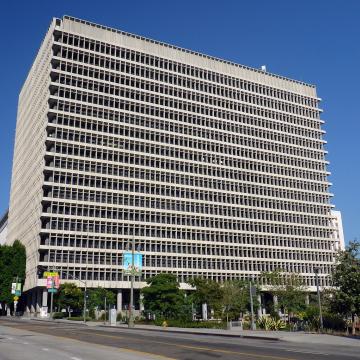Hannah Ibañez ’13 is a Level 2 Public Defender in Los Angeles who was appointed to the United States Access Board by President Joe Biden. She spoke with us about her passion for social justice, her love of philosophy, and her fondest memories of Simmons.
“Even before I decided to attend law school, I always gravitated toward social justice and advocacy,” says Hannah Ibañez ’13, a public defender in Los Angeles who double majored in Philosophy and Political Science at Simmons. “My time at Simmons influenced what I do now. . . . This line of work keeps me challenged and inspired, and allows me to be true to myself.”
In her current role, Ibañez represents clients facing diverse kinds of criminal charges. She enjoys the historic weight of the Los Angeles (LA) office. “In 1914, LA created the first Public Defender office in the country. It is now countywide [throughout Los Angeles county]. Because of LA's pioneering efforts, offices of the public defender spread throughout the entire country,” Ibañez explains. “LA also has the largest criminal defense firm in the world, comprising over 700 attorneys. I regard this city as the ‘OG veteran of the system,’ and my predecessors and colleagues have amazing legacy knowledge. It was always my goal to work here because of our wide range of specializations.”

Ibañez, who resides in Compton, conducts much of her work at the downtown Los Angeles courthouse, specifically the Clara Shortridge Foltz Criminal Justice Center. (The building is named after the first woman admitted to the California Bar and the first female lawyer on the West Coast. Foltz also came up with the concept of the public defender). This venue emanates legal history and local lore, as many high-profile cases transpired there.
Ibañez also appreciates the rich resources the city offers her clients, including mental health, housing, employment, and parenting resources. “The criminal justice system in the U.S. is generally a Band-aid on a bullet hole, but LA tries to rehabilitate people more holistically and proactively,” she says.
Championing Urban Underdogs
Although Ibañez does not identify as a religious person, she likes to think that the historical Jesus was a public defender of sorts, given his advocacy for society’s outcasts. “When I worked in the South, many conservative people criticized me for defending criminals. I would tell them that what I do is akin to Jesus saving the adulterous woman from being stoned (John 8). Shouldn’t we help those who are the most vulnerable, instead of banishing them into nothingness?”
Born in Belfast, Ireland to a British mother and Afro-Cuban father, Ibañez grew up in Miami and later returned there for law school. “In Florida, there are few nonprofits that deal with the nation’s housing crisis in a direct, intentional way. Coming to California was eye-opening for me because they acknowledge the intersectional complexity that underpins homelessness. In other words, there are myriad reasons why people fall into a state of homelessness, and just giving them a vacant hotel room during lockdown is not sufficient,” she explains.
Her colleagues in California realize that issues like homelessness must be addressed in an authentic, genuine way. “Otherwise, it just becomes a fancy ribbon-cutting ceremony,” she adds.
However, Ibañez also acknowledges that California’s legal system can be archaic and punitive. For instance, the state practices the Three Strikes Law, which imposes a prison sentence of 25 years to life on defendants once they are convicted of their third violent or serious felony. The death penalty technically still exists (although Governor Gavin Newsome ordered an official moratorium in 2019).
“In LA, the stakes are higher because the whole country is watching us. We are at the forefront of breakthroughs in indigent defense, as we are often the first state to experiment with pilot programs — the concept of public defense being one of many. While this puts some pressure on us, it also gives us exciting political momentum. We see this sense of urgency and innovation being activated with people like Mayor Karen Ruth Bass [the first female and second Black mayor of Los Angeles, and a former social worker], who declared a state of emergency on homelessness on her first day in office.”
Accepting a Presidential Appointment
Before working as a public defender, Ibañez devoted herself to advocating for individuals facing eviction and homelessness. Through this work, she was connected to Congresswoman Nanette Díaz Barragán. When Joe Biden won the presidential election in 2020, Barragán passed along Ibañez’s name to his administration.
“One day at 4 am I got a phone call from the White House requesting a phonetic spelling of my name. I hung up because I thought it was a prank call,” recalls Ibañez. “But later that day, I woke up to a bunch of emails, indicating that the call was legitimate.” President Biden had appointed her to serve as a Public Member of the United States Access Board.
In this role, Ibañez works to increase access to public spaces, such as increasing the width of an airline aisle to accommodate individuals with disabilities. She draws upon her expertise in accessibility and disability-related issues and her experience working with marginalized communities. “We use our jurisdictional power to create laws that are then codified by the Department of Justice,” says Ibañez. She is also a Public Member of the Elections Assistance Commission.
Finding Her Voice at Simmons
“Both my mom and my college counselor were insistent that I come to Simmons. They believed that I would thrive in a women’s-centered environment,” says Ibañez.
At Simmons, Ibañez fell in love with her philosophy coursework, which she calls her “brain food.” She reflects that “studying philosophy helped me think through arguments and writing, and I enjoyed learning how people think. Since I am neurodiverse, my mind works differently. The Department of Philosophy was a safe space to contemplate and analyze how brains work. Looking back, I think philosophy actually helped me feel less anomalous.”
As for specific philosophers, Ibañez admires René Descartes (1596–1650) for his insights into the philosophy of the mind and free will. She calls Friedrich Nietzsche (1844–1900) “the man I love to hate. . . . Although I found him frustrating, his thoughts on the decadence of modern civilization resonated with me, and I always wished I could meet him in person.”
Simmons’ commitment to social justice and an inclusive atmosphere also prepared Ibañez for her career. “I know we are going to a place where gender does not matter, and that is amazing. But coming of age in the early 2000s was difficult for me, as this was a very gendered era. When I was at Simmons, it was the first time I experienced a de-centering of the male-dominated demographic, and this was profoundly impactful for me,” she says.
Some of Ibañez’s most cherished Simmons memories involve her annual participation in the Vagina Monologues. She served as a director and a cast member, during which she portrayed The Flood, The Woman Who Loved to Make Vaginas Happy, and My Angry Vagina. “It was amazing; we were doing advocacy through theater,” she recalls.
Ibañez brought the production to her law school in Tampa, Florida. “I went from a women’s institution in the northeast to a good old boys’ school in the old South. I felt it was important to inscribe women’s voices and perspectives in that male-dominated space,” she says. “This way, I carried the Simmons torch into law school.”
For Simmons students and aspiring attorneys, Ibañez wants them to know that she is there for them. “I am a big believer in taking advantage of the resources you have available to you at Simmons and through Simmons alumnae/i. Please don’t hesitate to reach out to me. I invite you to connect with me on LinkedIn.”
Above all, Ibañez professes a message of love and caring for one another. “I am programmed to intervene on behalf of those who have been wronged unjustly. I believe that doing the right thing is our duty to have the privilege of living and interacting with other human beings on this earth.”

